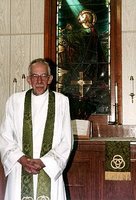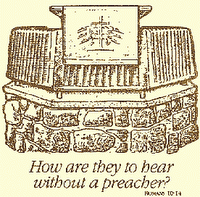Why I Became a Pastor
Q: What led you to become a pastor? Why do you remain one? What advice would you have for a new pastor or for your successor?
 A: The credit (or blame, if you aren’t fond of me) belongs to God; Even though I’m the firstborn son of a pastor and had a great-grandfather in the Office of the Holy Ministry, becoming a preacher never entered my mind as a young man. According to my parents, as a little boy I’d mimic Dad and preach the occasional sermon in our back yard, but my audience was whatever rabbits, chickens, or other critters we raised there.
A: The credit (or blame, if you aren’t fond of me) belongs to God; Even though I’m the firstborn son of a pastor and had a great-grandfather in the Office of the Holy Ministry, becoming a preacher never entered my mind as a young man. According to my parents, as a little boy I’d mimic Dad and preach the occasional sermon in our back yard, but my audience was whatever rabbits, chickens, or other critters we raised there.During most of our childhood, it was his second of four sons, my brother Paul, whom Dad probably thought had the greatest likelihood of becoming a pastor. I don’t recall thinking about what I wanted to be “when I grew up” until I was in junior high or high school.
During my junior and senior years of high school, after taking the my college boards, college applications and scholarship offers came in overwhelming fashion. was overwhelmed with college applications and scholarship offers. Teachers and guidance counselors either urged me to consider their own fields or else told me I could be whatever I wanted to be. Such an open field became almost as confining as having no options at all.
 After changing majors, changing colleges, leaving school for the banking field, and returning to classes, I began to think that perhaps I could be a pastor. The Lutheran school that began and completed my college career had good academics, plenty of social and sports options, and it offered a vibrant spiritual life. I thrived; I also wanted to give something back.
After changing majors, changing colleges, leaving school for the banking field, and returning to classes, I began to think that perhaps I could be a pastor. The Lutheran school that began and completed my college career had good academics, plenty of social and sports options, and it offered a vibrant spiritual life. I thrived; I also wanted to give something back.After only one semester, I switched to the pre-seminary program, although I wasn’t really sure why. Because I was unsure, I didn’t focus on either the studies or the spiritual preparation. During my time away from school, I realized that while God could use good, intelligent, hard working Christians in many occupations, I could probably be a good pastor if I stuck out the studies.
After college, I worked for a couple more years, then met the woman who’d become my wife at about the same time as I lost my job. Her encouragement helped me to get going in my seminary studies. Throughout four years of classes and one of internship (which we Lutherans normally call vicarage) in Billings, Montana, I was never absolutely certain that this is where God wanted me to be. I wasn’t still running away, but until I received the call documents from Faith and St. Paul Lutheran Churches in Woodville and Jasper, Texas, I didn’t know for sure.
 Now I do know. After seven fascinating, fruitful, and growth-provoking years in Texas, the Holy Spirit called again through Holy Cross Congregation here in Emma. Now I’m in my fifteenth year in the Holy Ministry. I enjoy feeding the flock entrusted to me, and can’t imagine myself doing anything else. I stay a parish pastor because God allows and encourages me to do so.
Now I do know. After seven fascinating, fruitful, and growth-provoking years in Texas, the Holy Spirit called again through Holy Cross Congregation here in Emma. Now I’m in my fifteenth year in the Holy Ministry. I enjoy feeding the flock entrusted to me, and can’t imagine myself doing anything else. I stay a parish pastor because God allows and encourages me to do so.The Lord does a fascinating job of leading us to become what He desires. While I’d not compare myself to them in terms of faithfulness, divine inspiration, or power of proclamation, I hold a few things in common with many of the prophets and apostles of Scripture. Like Elisha, who was called away from plowing his fields (1 Kings 19:19-21), Amos, who said “I was no prophet, nor a prophet’s son, but I was a herdsman and a dresser of sycamore figs, (7:14)” or Christ’s disciples, who’d been fishermen (Matthew 4:18-22), a tax collector (Matthew 9:9), and the like, I certainly didn’t seem to have my feet on the path of a church vocation.
 God did give me peculiar gifts and aptitudes, but none of these made me a pastor. At times, my greatest personal strengths can become hindrances to carrying out my office. As for my flaws, Jonah had nothing on me in terms of not always doing the Lord’s will (1:1-3). Isaiah (6:5), Jeremiah (1:6), and Moses (Exodus 4:1-16) combined thought of no more excuses than could I to avoid the ministry. Like Peter, I can make my brags (Matthew 26:35) only to see them come to naught (vv. 69-75). I can out-despair Elijah (1 Kings 19:10) and out-sin “the foremost” sinner (1 Timothy 1:15).
God did give me peculiar gifts and aptitudes, but none of these made me a pastor. At times, my greatest personal strengths can become hindrances to carrying out my office. As for my flaws, Jonah had nothing on me in terms of not always doing the Lord’s will (1:1-3). Isaiah (6:5), Jeremiah (1:6), and Moses (Exodus 4:1-16) combined thought of no more excuses than could I to avoid the ministry. Like Peter, I can make my brags (Matthew 26:35) only to see them come to naught (vv. 69-75). I can out-despair Elijah (1 Kings 19:10) and out-sin “the foremost” sinner (1 Timothy 1:15).Only God’s grace made and keeps me a servant of the Word. The Lord began my work as pastor, calling me by His Spirit active in His Church. As Saint Paul told Timothy, God “saved us and called us to a holy calling, not because of our works but because of his own purpose and grace. (2 Timothy 1:9)” Without Him, I am less than nothing — I would be an enemy of Christ and His Church.
 He still does the work, acting through Word and Sacrament to claim and hold people for Himself. Without Him, my heart would speak for my mind and my mind for my heart. I would be unyielding when flexibility was required and would bend when I should stand firm. I would speak when I should listen and would hold my tongue when I should speak a clear word. I would flee shadows or fight imaginary foes while avoiding wrestling “against the rulers, against the authorities, against the cosmic powers over this present darkness, against the spiritual forces of evil in the heavenly places. (Ephesians 6:12)”
He still does the work, acting through Word and Sacrament to claim and hold people for Himself. Without Him, my heart would speak for my mind and my mind for my heart. I would be unyielding when flexibility was required and would bend when I should stand firm. I would speak when I should listen and would hold my tongue when I should speak a clear word. I would flee shadows or fight imaginary foes while avoiding wrestling “against the rulers, against the authorities, against the cosmic powers over this present darkness, against the spiritual forces of evil in the heavenly places. (Ephesians 6:12)”I brought my circuitous route upon myself and recommend it to no other ministerial candidates. I regret my resistance, my arguing with God, and my foot-dragging but still thank God for all that I learned and the growth that He granted as I traveled this way.
As for preparation, I urge that whoever studies for the ministry also study the humanities. Understanding, speaking of, and writing about mankind’s condition all aid the minister. This means that literature and drama — as well as newspapers, encyclopedias, and theology books — can be used, for all tell us something about ourselves. And don’t just study people; live with them, love them, learn from them, and let your own humanity show — not in sin, but in good relationships and reputable behavior.
Don’t neglect science. It helps us to understand our world. Also, studying its truths, strengths, and shortcomings prepares you for those people who twist and distort it in order to attack Christianity. Even a healthy dose of math comes in handy — if not in the pulpit, then in your life at home.
 The would-be (or current) pastor should remain immersed in God’s Word. Not only sermon and Bible class preparation but personal and family study of Scripture and devotion are essential. Then he should study both orthodox Christian theology and the false teachings of cults, sects, and non-Christian religions.
The would-be (or current) pastor should remain immersed in God’s Word. Not only sermon and Bible class preparation but personal and family study of Scripture and devotion are essential. Then he should study both orthodox Christian theology and the false teachings of cults, sects, and non-Christian religions.As he grows, he will find himself following and becoming ever more like the apostle’s word in the Pastoral Epistles (e.g., 1 Timothy 3:1-7; 2 Timothy 1:6; 2:22-26; 4:1-5; Titus 1:5-9). God will lead him to live the life the apostle commends and to continue cultivating and displaying love for Christ’s Church and for the lost, whom He wishes to make His own. He will be fervent in prayer for himself, his family, his flock, and for all people everywhere.
Final advice for new pastors? Stay in God’s Word — don’t just read about it, read the Word itself. Trust His promises of grace and guidance and believe wholeheartedly in Him. He constantly forgives, renews, and strengthens you for your labors. It won’t always be easy, but a faithful pastor will always know the joy of working as an under-shepherd to the Good Shepherd Jesus Christ.
See also the previous articles Preparing to Become a Pastor and A Pastor’s Heart.
Scripture quoted from The Holy Bible, English Standard Version™, © 2001 by Crossway Bibles.
Send email to Ask the Pastor.
Walter Snyder is the pastor of Holy Cross Lutheran Church, Emma, Missouri and coauthor of the book What Do Lutherans Believe.
Technorati Tags: pastoral formation | Lutheran | pastors | holy ministry | Pastoral Epistles | becoming a pastor | clergy | ministry | seminary | autobiography

0 Comments:
Post a Comment
<< Home